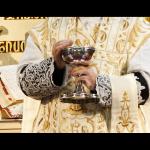Ciudad del Este, Paraguay, Sep 26, 2014 / 03:44 pm (CNA/EWTN News).- Bishop Rogelio Livieres Plano has accepted in obedience Pope Francis’ decision to remove him from governance of the Ciudad del Este diocese, though he says the action resulted from a flawed apostolic visitation and that his country is in vital need of Christian renewal. “As an obedient son of the Church, I nevertheless accept this decision, despite considering it to be unfounded and arbitrary,” Bishop Livieres said in a Sept. 25 letter to Cardinal Marc Ouellet, prefect of the Congregation for Bishops. “Despite so much discourse about dialogue, mercy, openness, decentralization, and respect for local Churches, I haven’t have the opportunity to talk to Pope Francis, not even to clarify a doubt or a concern.” On Sept. 25 the Holy See announced that Pope Francis has decided to remove the bishop from the Diocese of Ciudad del Este “for serious pastoral reasons and for the greater good of the unity of the Church in Ciudad del Este and the episcopal communion in Paraguay.” Bishop Ricardo Valenzuela Rios of Villarrica del Espiritu Santo has been appointed as apostolic administrator of the diocese while it is vacant. Bishop Livieres' removal followed a five-day apostolic visitation of the diocese which took place in July. At the end of that month, it was announced that ordinations in the diocese were to be suspended. Bishop Livieres, who had led the diocese since 2004, said he has still not seen the documents regarding the apostolic visitation and has not been able to “adequately respond to it.” He said the document removing him from his office “gives as justification for such a grave decision the tension in the ecclesial community between the bishops of Paraguay, and my person and diocese.” Bishop Livieres opened a major seminary soon after his arrival in the diocese. He shortened its formation period to four years on the grounds that new priests were urgently needed. More than 60 graduates of the seminary have become priests in the last ten years. The diocese also opened a minor seminary and an institute for priestly formation. Before Bishop Livieres’ removal, a statement on the diocese’s website charged that the Paraguayan bishops “resisted” these seminaries because they would “break the monolithic scheme of priestly formation” in practice at Paraguay’s national seminary. Bishop Livieres defended the seminaries of his diocese, noting that the Congregation for Catholic Education found “defective formation” in Paraguay’s national seminary. “Our diocesan seminary has provided excellent fruits recognized by recent laudatory letters from the Holy See in at least three occasion during the previous pontificate, by the bishops who have visited us, and most recently, by the apostolic visitators. Every single suggestion made by the Holy See regarding how to improve the formation has been faithfully fulfilled.” He also noted that Church unity “is built from the Eucharist and from respect, observance, and obedience to the faith of the Church, normatively taught by the Magisterium, articulated by ecclesial discipline, and lived in the liturgy.” “Now, instead, there is a desire to impose a unity not based upon divine law, but upon human agreements and a maintenance of the status quo.” Another “criterion of ecclesial unity” in the Paraguayan situation, he said, “is uncritical coexistence among ourselves based on a uniformity of action and thought, which excludes dissent in defense of truth and legitimate variety of gifts and charisms.” “This ideological uniformity is imposed with the euphemism of 'collegiality.'” The bishop said that the faithful of Paraguay suffer from the poor state of the Church there. He said the other local Churches are “lethargic” and there is a “large exodus” to other Christian denominations. “The true problem of the Church in Paraguay is the crisis of faith and moral life that an ill formation of the clergy has been perpetuating, together with the negligence of its shepherds.” He said “opposition to any renewal and change” is found not only among bishops, but also among political and anti-Catholic groups and some religious in the Paraguayan Religious Conference. He attributed attitudes among the last group to “the worldwide crisis in religious life.” Bishop Livieres, who was ordained a priest of Opus Dei, said he had been subject to “attacks and maneuvers” since before he became bishop, as shown in correspondence between the bishops of Paraguay and the Congregation for Bishops. “My case has not been the only one in which a bishops’ conference has systematically opposed an appointment made by the Pope. I had the blessing of being supported by St. John Paul II and Benedict XVI. I understand that Pope Francis has decided to pull his support.” Bishop Livieres voiced a desire to avoid “useless complaints,” but said the apostolic visitation proceeded “without formalities” and in “an unpredictable manner” that did not provide a chance to defend himself against accusations or to correct possible mistakes. He added that “the Pope will have to give an account to God” of the decision, “not to me.” The investigation into the Ciudad del Este diocese has drawn attention to a priest whom Bishop Livieres allowed to minister there. Until July, the diocese’s vicar general was Fr. Carlos Urrutigoity, an Argentine native who has been accused of sex abuse in multiple ountries. He was accused in a lawsuit of sexual misconduct involving a student at the now-closed St. Gregory’s Academy in the Diocese of Scranton. In 2002, the priest was suspended by Scranton’s then-bishop, along with another priest in the Society of St. John, an association of the faithful that Fr. Urrutigoity had founded and which the local bishop also suspended. The Diocese of Scranton has said that it voiced “serious cautions” and “grave doubts” to Bishop Livieres about the priest’s suitability, but that the Paraguayan bishop told the diocese he would allow Fr. Urrutigoity to serve as a priest. Read more



















